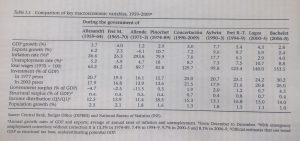Davis-Hamel, A. Successful Neoliberalism?: State Policy, Poverty, and Income Inequality in Chile. Kansas: Pi Gamma Mu, 2012.
This study examines the effects of Chile’s neoliberal transformation in particular looking at levels of poverty and income inequality. Ultimately, the author argues that deviation from “extreme neoliberalism” through government investment in social programs was necessary to improve socioeconomic conditions. The information in this article will be extremely useful for my podcast. I will use it outline how exactly the Chilean miracle was implemented, through a series of privatization reforms, cutting welfare spending, and decreases in labor power. The paper cites a number of statistics that put how drastic these reforms were in persepective that I will also highlight in my podcast. Additionally, this journal article provides a good definition of neoliberalism and talks about how Chile is such a good example of neoliberal policies in action, which I also plan to include in my podcast. In terms of perspective, this piece takes an aggressive negative stance in regards to the Chilean miracle; I hope to find another journal article to compare it to that argues that the Chilean miracle was ultimately advantageous for the Chilean economy and society.
Ffrench-Davis, Ricardo. Economic Reforms in Chile: From Dictatorship to Democracy. Houndmills, Basingstoke, Hampshire: Palgrave Macmillan, 2010.
This text gets into the nitty-gritty details of economic reform in Chile from the 1970s until now. There are a number of helpful visual aids throughout this book such as a table comparing “macroeconomic variables” like GDP growth, inflation, wages, unemployment, etc. between the different regimes (see figure below) and a table depicting “poverty evolution in Chile” from 1980 until 2006. The book discusses how specific industries, like copper and oil, were affected by the different policies implemented by different regimes. There is an entire chapter on “pure neoliberalism” [1973-1981] that goes into more of the details as to how privatization slowly transformed the economy. In particular, this chapter highlights how increases in export volume affected overall growth. This text takes a very neutral stance towards the Chilean miracle; it provides an objective, historical overview of economic policy and the observable, statistically driven economic effects. In this way it varies greatly from the Davis-Hamel article. A lot of the economic details went over my head, but I plan on using this text for the hard numbers in my conclusion section and in explaining how the Chilean miracle transpired.

Reflection
I felt like my research this week really helped push my project along. The Davis-Hamel article was really useful in providing me with one perspective as to the overall success of the Chilean miracle, and where my research stands right now their argument is pretty similar to what I’m going to argue in the conclusion of my podcast. That being said, I hope to find more sources that help me look outside just this one argument and that really highlight how neoliberal reform was advantageous to some (primarily the wealthy). I found the Ffrench-Davis text a little less helpful. If I was writing a paper instead of doing a podcast, I think some of the graphs and tables would be incredibly useful as supporting evidence that I could include in my paper. However, I think they still work to help highlight the tangible on the ground effects of the policies and provided me with a better understanding of how different parts of the economy were affected.
Comments:
Thanks for this, Sydney. I liked your reflection on your sources. I would like to point out two terms that you are using: “extreme neoliberalism” and “pure neoliberalism.” If you are going to use any of these terms, make sure to clarify what you mean in your podcast. In Latin America, neoliberal policies indeed initially produced devastating effects on societies, which were to some extent addressed by some redistributive policies (as you mention in your reflection on the first source). Thus, it is a good idea to see neoliberalism as a set of experiments that were often revised and redesigned with changing circumstances.
Also, I agree that finding a counter-argument about Chilean miracle would strengthen your own argument.
